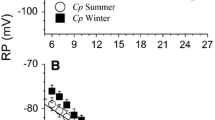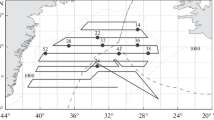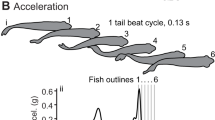Synopsis
Contraction time of an isolated white muscle from the temperate water Girella tricuspidata is proportional to temperature and inversely proportional to fish size. Between ambient (14°C) and 8° C muscle from all sizes of fish is similary affected by temperature; the lower the temperature the more the contraction time is slowed. Below 8° C muscle from large fish is affected more than is muscle from small fish. Contraction time of white muscle in the antarctic notothenioid Pagothenia borchgrevinki is about twice as fast as that of Girella tricuspidata at temperatures between 2–12°C, but at normal body temperature, contraction time of muscle from Girella tricuspidata (14°C) is about twice as fast as that of Pagothenia borchgrevinki (−1.9°C).
Similar content being viewed by others
References cited
Andriashev, A.P. 1970. Cryopelagic fishes of the Arctic and Antarctic and their significance in polar ecosystems. pp. 297–304. In: M.W. Holdgate (ed.) Antarctic Ecology, Academic Press, London.
Brill, R.W. & A.E. Dizon. 1979. Effect of temperature on isotonic twitch of white muscle and predicted maximum swimming speeds of skipjack tuna, Katsuwonus pelamis. Env. Biol. Fish. 4: 199–205.
DeVries, L.A. & J.T. Eastman. 1981. Physiology and ecology of notothenioid fishes of the Ross Sea. J. Roy. Soc. N.Z. 11: 329–340.
DeWitt, H.H. 1970. The character of the midwater fish fauna of the Ross Sea, Antarctica. pp. 305–314. In: M.W. Holdgate (ed.) Antarctic Ecology, Academic Press, London.
Johnston, I.A. 1983. On the design of the fish myotomal muscles. Mar. Behav. Physiol. 9: 83–98.
Johnston, I.A. & R. Brill. 1984. Thermal dependence of contractile properties of single skinned muscle fibres from Antarctic and various warmwater marine fishes including Skipjack Tuna (Katsuwonus pelanus) and Kawakawa (Euthynnus affinis). J. Comp. Physiol. B. 155: 63–70.
Montgomery, J.C. & J.A. Macdonald. 1984. Performance of motor systems in antarctic fish. J. Comp. Physiol. A. 154: 241–248.
Somero, G.N. 1969. Enzymic mechanisms of temperature compensation: immediate and evolutionary effects of temperature on enzymes of aquatic poikilotherms. Amer. Nat. 103: 517–530.
Wardle, C.S. 1975. Limit of fish swimming speed. Nature (Lond.) 255: 725–727.
Wardle, C.S. 1977. Effect of size on swimming speeds of fish. pp. 299–313. In: T.J. Pedley (ed.) Scale Effects In Animal Locomotion, Academic Press, New York.
Wardle, C.S. 1980. Effects of temperature on the maximum swimming speed of fishes. pp. 519–531. In: M.A. Ali (ed.) Environmental Physiology of Fishes, Plenum Press, New York.
Webb, P.W. 1975. Hydrodynamics and energies of fish propulsion. Bull. Fish. Res. Board Can. 190, 158 pp.
Author information
Authors and Affiliations
Rights and permissions
About this article
Cite this article
McVean, A.R., Montgomery, J.C. Temperature compensation in myotomal muscle: Antarctic versus temperate fish. Environ Biol Fish 19, 27–33 (1987). https://doi.org/10.1007/BF00002734
Received:
Accepted:
Issue Date:
DOI: https://doi.org/10.1007/BF00002734




